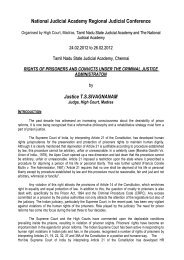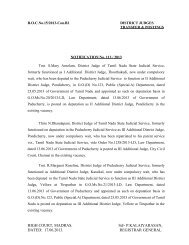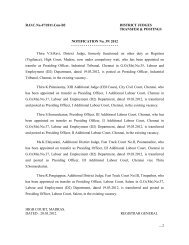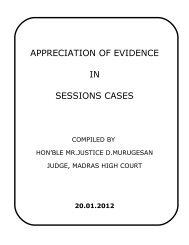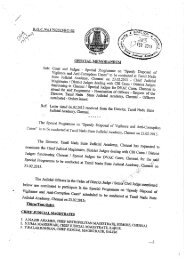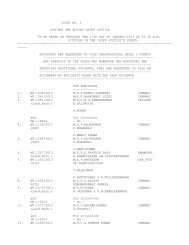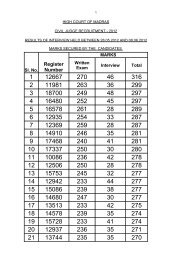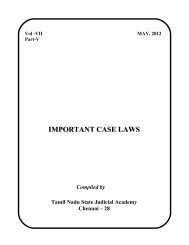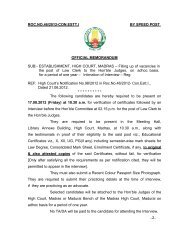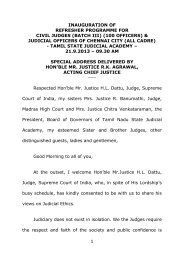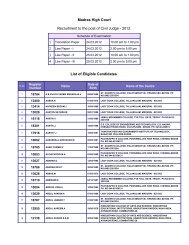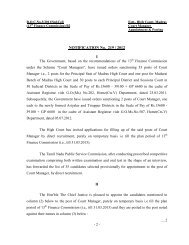IMPORTANT CASE LAWS - Madras High Court
IMPORTANT CASE LAWS - Madras High Court
IMPORTANT CASE LAWS - Madras High Court
You also want an ePaper? Increase the reach of your titles
YUMPU automatically turns print PDFs into web optimized ePapers that Google loves.
Director of Company was accepted and notified of Registrar of Companies in prescribed form (Form 32) – On facts,<br />
resignation of appellant as Director of Company was accepted and notified to Registrar of Companies in prescribed<br />
form (Form 32) – On date when offence was committed by Company, appellant was neither Director of Company<br />
nor had anything to do with affairs of Company – Hence, held, if criminal complaints are allowed to proceed against<br />
appellant, it would result in gross injustice and tantamount to abuse of process of court – Hence quashed –<br />
Corporate Laws – Company Law – Corporate criminal liability – Ex-Director, held, cannot be made liable for acts of<br />
company post his resignation – Companies Act, 1956 – S. 291 – Criminal Procedure Code, 1973, S. 482.<br />
Criminal Procedure Code, 1973 – Ss. 482 and 397 – Quashing of proceedings under, by appreciating<br />
evidence – When permissible – Consideration of defence at prima facie stage by <strong>High</strong> <strong>Court</strong> under revisionary<br />
power or under inherent powers is not absolutely barred – In order to prevent injustice or abuse of process or to<br />
promote justice, <strong>High</strong> <strong>Court</strong> may look into materials which have significant bearing on the matter at prima facie<br />
stage – <strong>High</strong> <strong>Court</strong> can quash complaint if materials relied upon by accused are beyond suspicion or doubt or<br />
which are in the nature of public documents and are uncontroverted – In present case, <strong>High</strong> <strong>Court</strong> refused to<br />
interfere with complaint (under revisionary power) and allowed trial against Director of company where offence was<br />
committed by stand on the face of documents which are beyond suspicion or doubt, it would be travesty of justice<br />
if accused is relegated to trial and asked to prove his defence before trial court – Complaints against appellant<br />
quashed – Corporate Laws – Corporate criminal liability – Quashment of proceedings – Documents that may be<br />
relied on in defence – Companies Act, 1956, S. 291.<br />
Held:<br />
It is not the law that in a criminal case where trial is yet to take place and the matter is at the stage of issuance of<br />
summons or taking cognizance, materials relied upon by the accused which are in the nature of public documents or the<br />
materials which are beyond suspicion or doubt, in no circumstance, can be looked into by the <strong>High</strong> <strong>Court</strong> in exercise of its<br />
jurisdiction under Section 482 or for that matter in exercise of revisional jurisdiction under Section 397 of the Code. It is<br />
fairly settled now that while exercising inherent jurisdiction under Section 482 or revisional jurisdiction under Section 397 of<br />
the Code in a case where complaint is sought to be quashed, it is not proper for the <strong>High</strong> <strong>Court</strong> to consider the defence of<br />
the accused or embark upon an enquiry in respect of merits of the accusations. However, in an appropriate case, if on the<br />
face of the documents – which are beyond suspicion or doubt –placed by the accused, the accusations against him cannot<br />
stand, it would be travesty of justice if the accused is relegated to trial and he is asked to prove his defence before the trial<br />
court. In such a matter, for promotion of justice or to prevent injustice or abuse of process, the <strong>High</strong> <strong>Court</strong> may look into the<br />
materials which have significant bearing on the matter at prima facie stage.<br />
(2011) 3 Supreme <strong>Court</strong> Cases 496<br />
Mona Panwar<br />
vs<br />
<strong>High</strong> <strong>Court</strong> of Judicature of Allahabad through its Registrar and Ors<br />
Criminal Procedure Code, 1973 – Ss. 156(3), 200 and 482 – Application under S. 156(3), but initiation of<br />
proceeding directly under S. 200 – Warrantedness – Scope of interference by <strong>High</strong> <strong>Court</strong> – Application filed under<br />
S. 156(3) by R-3 (alleged rape victim), before appellant Judicial Magistrate, alleging rape by her father-in-law and<br />
praying that appellant direct police to register her complaint and investigate case against accused under S. 156(3) –<br />
Appellant, after calling for police report and considering all material filed by R-3 finding case unfit to be referred to<br />
police for investigation under S. 156(3), therefore, directed application to be registered as complaint and further<br />
order Registry to present file before her for recording statement of R-3 under S.200 – However, <strong>High</strong> <strong>Court</strong>, while<br />
severely criticizing appellant for such order, set aside the order and directed appellant to decide application of R-3<br />
within ambit of her power under S. 156(3) and also directed her to pass an order for registration of FIR against<br />
erring police officers, who had refused to registration of FIR against erring police officers, who had refused to<br />
register FIR of R-3 – Sustainability – If on reading of complaint, Magistrate finds that allegations therein disclose<br />
cognizable offence and forwarding of complaint to police for investigation under S. 156(3) will not be conducive to<br />
justice, held, Magistrate will be justified in adopting the course suggested in S. 200 – Herein, judicial discretion<br />
9



